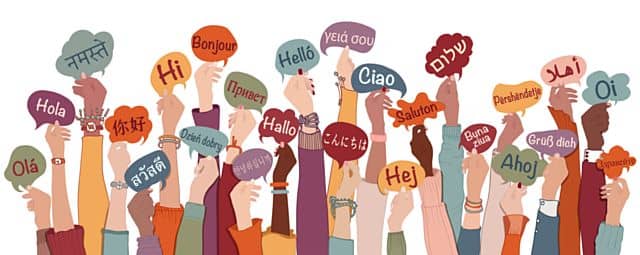An amazing brain asset that will allow you to become bilingual and more!
What scares most of us about starting a new journey into language learning?
Most of the time, it is the notion that our mother tongue gets in the way and prevents us from thriving in our new learning. Our “assumed inabilities” are often used as an argument not to risk investing time and money in learning a language.
But we forget about our amazing brain’s abilities
One of them is called inhibition, a mechanism that allows the suppression of interfering information or prepotent responses1. Fundamentally, this is a great asset and one which will allow us to drop our mother tongue during our conversations with foreigners, and discover the freedom of communication all over the planet.
Let’s dive into the topic of inhibition and discover what our brain is capable of when learning new things!
What will happen when I learn a second language?
Multilinguals and language learners have to inhibit preponderant words from the native language that may interfere with the correct utterance in the non-native language1.
You know the drill, don’t you?
There is a little voice inside your head telling you the word you need in your native language (or one of the other languages you master) instead of the target language. It usually happens at the beginning of a language journey, when you haven’t yet processed the basics of the new language you are learning.
Multilinguals have to control their languages constantly to produce accurate verbal output..1
It feels like a real effort at first
However, the more you expose yourself to your second language, the more you activate the inhibition function and create space in your brain to properly welcome this new language!
Our brains have an incredible elasticity and can change over time, as we expose them to new challenges and skills.
Trust in your potential!
If you manage to learn your native language – your possibilities are limitless!

How can I boost the inhibition mechanics?
Immersion! As supported by many studies since the 1970’s, immersion is the only way to go. Not only does it help to be surrounded by the language at all times, but one of the other main benefits is that it frequently puts you in a situation in which you need to find a way to communicate in a second language if you really want to survive.
When you’re immersed, learning the language becomes a way of avoiding stress and making your life more efficient, rather than a meager personal / academic pursuit that can be put off for any period of time.
However, immersion is not possible for all of us
As a compromise, an immersive-like learning journey, with native interlocutors speaking exclusively in their language to you, is what can keep you going best!
And that’s exactly what we offer at VivaLing
A truly immersive language learning experience, where your coach will not only speak in your target language, but also help you discover some fascinating aspects of their culture, life, surroundings, and even more. All of that from the comfort of your own sofa!
Will I ever forget my first language?
The technical term for forgetting—or losing—your native language is “First-language Attrition”.
And yes, there are people who have completely lost a language
However, it is rare. Normally these people left their home country as children and never returned. Their language wasn’t fully developed, and often there’s a psychological element.
When you know more than one language, all your languages are constantly active in the brain. So, to stop you using the wrong language the brain has a suppression mechanism that effectively puts a language to sleep when you’re not using it. But when you start using it again, it will quickly “wake up”. The same goes for the languages you have been learning and mastering at a proficient level in the past. At first, they seem to have been forgotten, but plan an immersive trip or experience and you’ll discover it is still here, inhibited and hibernating!
In most situations, we call the phenomenon of “forgetting” our native language a “dulling”. Sometimes, it is because the brain spots an easier, or more coherent way to express an idea in the target language than in the native language.
For example, an English speaker who has been immersed in a Spanish-speaking environment for a while, might use ‘madrugar’ when addressing other English natives, instead of ‘wake up early’. One short word as opposed to three.
The same goes for Προλαβαινω (prolaveno) in Greek. It has many different uses in English so there is no direct translation. (to have too many obligations, to beat somebody to it, to catch a glimpse of something or somebody, etc).

If I add more languages, will the inhibition still work, and how?
The precise mechanisms that allow for the successful control of multiple languages have yet to be definitely established2.
However, the more the merrier, is generally accepted
The frequent practice managing competition not only within, but also between languages may make bilinguals more efficient at resolving linguistic conflicts2.
Once you have become bilingual, your brain is set up and ready for more
That is why one should not fear pursuing their language journey after learning a second language. The natural elasticity of your brain will be emphasized by the experience of language learning. Moreover, it will contribute to preventing your brain from decaying and suffering modern diseases such as Alzheimers and dementia, as supported by various studies.
That is without mentioning very young learners, babies, toddlers, pre-schoolers, for whom language learning is a real walk in the park due to their intense neural production and amazing cerebral elasticity. This is sometimes referred to as the “critical period” in which each family should allow a child to be exposed to more than one language. For more real-life feedback, discover our other blog post on VivaLing professionals testifying to raising their multilingual kids.
1Maria Borragan – Exploring Different Types of Inhibition During Bilingual Language Production – Front. Psychol., 20 November 2018
2Consequences of multilingualism for neural architecture | Behavioral and Brain Functions | Full Text (biomedcentral.com)




